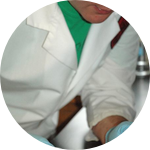About This Project
Sepsis is a condition that affects 18 million people a year with a mortality rate of 30%, resulting in an annual cost of $16.7 billion in the U.S. alone. Our lab is dedicated to understanding the signaling that occurs after infection allowing development of treatments against bacteria responsible septic shock. To further our studies, we need to purchase two multichannel pipettes.
Ask the Scientists
Join The DiscussionWhat is the context of this research?
Our lab is focused on understanding how the cells in your immune system respond to infections.
We need to screen multiple treatments and drugs for their effects on gene expression to test how the cells are responding.
Currently, we only have access to a single pipette which requires me to individually pipette reagents into a plate that has 96 or more individual units each time.
Because our tests are time and light sensitive, it is crucial that we are able to add reagents to all 96 wells at in a small time interval.
We're raising money for a multichannel pipette on Microryza, so that we can greatly increase the accuracy of our data and also increase the number of genes we can screen, pushing our work to the next level!
What is the significance of this project?
Our lab recognizes the urgent need to better understand what happens during septic shock.
·The incidence rate of sepsis and septic shock is ~18 million cases a year world wide with a mortality rate ~30% resulting in an annual total cost of $16.7 billion in the United States.
·The development of effective vaccines for sepsis has been difficult due to the various different types of bacteria and other microbes can cause sepsis.
·Over 52% of sepsis cases in the United States are caused by Gram-positive bacteria.
·Our lab studies Staphylococcus aureus (staph), a non-motile Gram-positive spherical bacteria. Staph infections are often fatal causing sepsis, bacterial pneumonia, and endocarditis (infection of the heart valves).
·Sepsis is currently treated through antibiotics, however there is a rapid emergence of antibiotic resistant bacteria.
Drug-resistant forms of staph infections (i.e. MRSA and VRSA) are of high concern in the hospital setting.
·The Centers for Disease Control and Prevention (CDC) recently reported the following key findings about Sepsis:
·The number and rate per 10,000 population of hospitalizations for septicemia or sepsis more than doubled from 2000 through 2008.
·The hospitalization rates for septicemia or sepsis increased with age.
·Patients hospitalized for septicemia or sepsis in 2008 were sicker and stayed longer than those hospitalized for other
conditions.
·In the US, 17% of septicemia or sepsis hospitalizations ended in death, whereas only 2% of other hospitalizations did.
Click below for a direct link to the CDC's findings:
Hall MJ, Williams SN, DeFrances CJ, Golosinskiy A. Inpatient care for septicemia or sepsis: A challenge for patients and hospitals. NCHS data brief, no 62. Hyattsville, MD: National Center for Health Statistics. 2011.
What are the goals of the project?
The funds will be used immediately to purchase two multichannel pipettes. We do not have these in our lab and currently are forced to use a single pipette and adding reagents one by one to each well.
Unfortunately this greatly increases error and limits the amount of data we can generate. The multichannel pipettes are urgently needed and they will greatly increase the accuracy and volume of the data we are able to generate.
With two multichannel pipettes, I will over double the amount of data I currently generate. Without the multichannel pipettes, I am only able to screen the expression of 2 genes at a time, but with the increased accuracy of the multichannel pipette, I will be able to screen 7 genes with one test.
I will share the completed results with you through online updates and plan to publish the research once we have completed the planned experiments. If the journal allows I will reference microryza in the acknowledgements section of the publication and recognize the support and generosity of the donors.
Thanks in advance for helping to move our research to a higher level!
Budget
The funds will immediately be used to purchase multichannel pipettes which will be used to set up our quantitative polymerase chain reaction (qPCR) assays. These tools will greatly increase the accuracy and volume of the data we collect.
Endorsed by
Meet the Team
Team Bio
Michael Bechill received his bachelors of science in 2008 from The University of Saint Francis in molecular and cellular biology. While an undergraduate he was selected to be a summer research fellow at multiple institutions including the University of Cincinnati, Old Dominion University, and the Medical University of Ohio. Michael is currently a Ph.D. candidate in the biomedical sciences research program in the college of medicine infection, immunity and transplantation track and part of The Department of Medical Microbiology and Immunology at the University of Toledo Health Sciences Campus.
Michael Bechill
Michael Bechill received his bachelors of science in 2008 from The University of Saint Francis in molecular and cellular biology. While an undergraduate he was selected to be a summer research fellow at multiple institutions including the University of Cincinnati, Old Dominion University, and the Medical University of Ohio. Michael is currently a Ph.D. candidate in the biomedical sciences research program in the college of medicine infection, immunity and transplantation track and part of The Department of Medical Microbiology and Immunology at the University of Toledo Health Sciences Campus.
Lab Notes
Nothing posted yet.
Project Backers
- 3Backers
- 50%Funded
- $885Total Donations
- $295.00Average Donation

